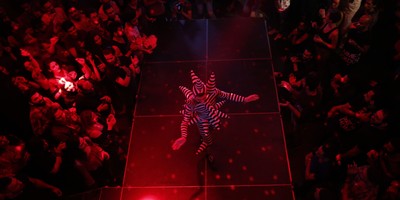Ever since Mitt Romney's unsuccessful run for the 2008 Republican presidential nomination, there has been much discussion of whether GOP voters would accept a Mormon candidate. Would evangelical conservatives, in particular, look past the former Massachusetts governor's faith to vote for him? The underlying assumption was that the more conservative the views, the more intolerant the voter.
Now, it turns out a better question might be whether Democratic voters would accept a Mormon candidate. In a survey that cuts against the media stereotype, a new Gallup Poll has found that more Democrats than Republicans say they would not vote for a Mormon for president. Twenty-seven percent of Democrats say they wouldn't vote for a Mormon, while 18 percent of Republicans say the same. For independents, the figure is 19 percent.
Of course, the two Mormons in the race, Romney and former Utah Gov. Jon Huntsman, are both Republicans. But should either win the GOP nomination, they'll be looking for all the votes they can get, including those of independents and disaffected Democrats. Anti-Mormon bias among any of those groups can't help.
Ask church officials about the party disparity, and they carefully avoid the question. "We are politically neutral," says Michael Purdy, spokesman for the Church of Jesus Christ of Latter-day Saints, "and are pleased when good men and women decide to participate in the political process and serve with integrity."
But talk to church representatives about the general issue of Mormon acceptance, and you'll get a glimpse of how they view the party divide. As they see it, familiarity tends to breed acceptance. "We have found that as others get to know us that reservations they may have about us tend to lessen," says Purdy. "The church is growing, and people are increasingly likely to know a member of the faith -- a friend, a colleague, a neighbor."
Recommended
In other words, when people don't know any Mormons and don't know much about Mormonism, they tend to view Mormon candidates with suspicion. Once they become more familiar with the church and its members, they become more relaxed about it.
Many Mormons are quite conservative, and of course Utah is one of the most conservative states in the country. It's possible that a significant number of Democrats and blue-state residents, some of them cocooned in liberal enclaves, just don't know many Mormons and harbor negative ideas and stereotypes about the unknown.
Perhaps the most striking news in the Gallup survey is the durability of anti-Mormon bias. For more than 40 years, Gallup has asked a simple question: "If your party nominated a generally well-qualified person who happened to be a Mormon, would you vote for that person?" In the most recent survey, 76 percent of those polled said they would vote for the Mormon candidate, while 22 percent said they would not.
In 1967, when Gallup first asked the question, 75 percent said they would vote for a Mormon, while 17 percent said they wouldn't. The results were practically the same as they are today.
"The stability in U.S. bias against voting for a Mormon presidential candidate contrasts markedly with steep declines in similar views toward several other groups over the past half-century, including blacks, women, Catholics, and Jews," writes Gallup. "The last time as many as 22 percent of Americans said they would not vote for any of these groups (the same level opposed to voting for a Mormon today) was 1959 for Catholics, 1961 for Jews, 1971 for blacks, and 1975 for women. Opposition to voting for each of these has since tapered off to single digits."
But not for Mormons.
Maybe that will change, at least a little, if Romney and Huntsman make it to the final stretch of the Republican race. They present two different faces of the faith -- Romney is deeply devoted to the church while Huntsman stresses his spirituality and expresses a generalized pride in his "Mormon roots." Church officials won't comment on any individual candidate but they do seem to welcome the increased attention the campaign brings. "With the increased conversation about Mormons of late, we are striving to do a better job in joining the conversation and defining ourselves rather than having others define us," says Purdy.
There will be a lot more conversation if Romney or Huntsman becomes the GOP nominee. And perhaps there will be a serious discussion of the acceptance question -- on both sides of the party divide.

























Join the conversation as a VIP Member